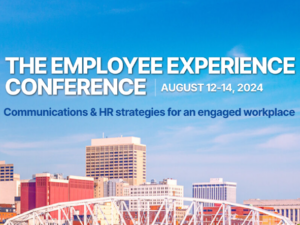Political discourse at work: Managing the 2024 election
It’s no longer apt to apply the adage that you should never discuss politics or religion at work.

As Chief Innovation Officer at Peppercomm, Jackie Kolek is responsible for identifying challenges and opportunities that clients are facing, and developing new solutions and services to help them mitigate risks and capitalize on changes that drive their business forward.
With Donald Trump leading the race for the GOP nomination, the 2024 Presidential Election is shaping up to be the longest presidential race in history. News coverage and the national dialogue will soon shift from “Who are the candidates?” to “What do the candidates stand for?”. In such a polarizing political climate, businesses are bound to see an uptick in political conversations and potential disagreements in the workplace.
It’s no longer apt to apply the adage that you should never discuss politics or religion at work. In fact, according to a Glassdoor survey, over 60% of US employees report having discussed politics with colleagues at work over the past 12 months.
For employees today, the results of the 2024 election are about more than tax hikes or the candidates’ pedigree. There were a record 510 anti-LGBTQ bills introduced in state legislatures in the past year, reported incidents of antisemitism have risen 337% since October, and legislation focused on the reproductive rights of women continues to take center stage across the nation. These issues are deeply personal for your employees and many view the results of the 2024 election as a matter of life and death.
How can employers prepare for potential political discourse in the office while supporting employees and protecting their brand? It’s not an easy mountain to climb, but there are a few key steps that should be taken now before the inter-office debates begin.
Establish the ground rules
Now is the time to remind your employees of your code of conduct policies. Refresh their memories of those sections of your employee handbook, especially those that address bullying, harassment, and social media – including their personal handles. Ensure all employees understand that hate speech in any form will not be tolerated and that they are clear on the consequences should they violate these rules.
Foster a supportive environment
Employee Resource Groups (ERGs) can play a critical role in ensuring the well-being and safety of your employees during what could be a very difficult time. Tap into these groups to help promote connections between employees, create support forums and establish a process to discuss and report any concerns or issues they are experiencing in the workplace. Not only are ERGs a wonderful support network for employees, but they can also serve to help employees channel their concerns in a constructive environment and avoid behaviors that can drain productivity.
Create an issues map
According to a recent Gallup Poll, nearly 50% of Americans believe that businesses should take a public stance on political and social issues. That means half your workforce may be looking for you to weigh in on the election – and this number is even greater among the younger generations. As a business, you need to create a map of the issues that impact your organization, employees and the stakeholders you serve and decide if, when and where you are willing to speak out. For some businesses, this may be a small task depending upon the type of industry you are in and the states in which you operate. For complex organizations with diverse stakeholder groups and large geographic reach, this will be a significant undertaking.
The key is to create an objective process for determining the issues that matter to you as an organization and establish clear and consistent criteria for your decision-making. It is also important to look at your history of discussing social issues. For example, if you spoke out on the Black Lives Matter movement, did you speak out against the rise in antisemitism? If not, why? Making sure you can communicate how and why you took certain positions is critical to setting expectations among your stakeholders and justifying current and future actions.
Be a trusted source of information
Enhancements in AI technology, including deepfakes, are driving a dramatic increase in disinformation and misinformation that even the savviest of social media sleuths find hard to differentiate. At a recent conference I attended, one political consultant predicted we will be seeing multiple deepfake videos of President Biden falling down the steps of Air Force One. These videos are designed to reinforce the narrative that he is too old for office and their authenticity will be nearly impossible to detect for the average Facebook user.
As an employer, you can become a trusted source of credible, factual information. This can include creating a list of third-party, independent resources, bringing in outside speakers or aligning with advocacy groups that can offer insight and guidance during turbulent times. Encourage employees to seek out authoritative, verified sources of information, especially ones that have been through editorial reviews.
The next ten months are likely to be fraught with emotions ranging from anger and despair to hope and joy. As an employer, it is unrealistic and ill-advised to simply try and tamp down any political discourse or try to control how these topics are discussed. Rather, employers should advocate for and support civil discourse where issues can be discussed based on facts in a respectful environment without judgment or vitriol.
Learn more about where comms and politics intersect at Ragan’s Public Affairs & Speechwriting Virtual Conference on Wednesday, February 21, 2024 11 a.m.-3:30 p.m. ET.






